The Knight is Darker, but Viewer will Endure
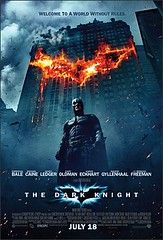 THE DARK KNIGHT
THE DARK KNIGHT
review by James Harleman
starring Christian Bale and Heath Ledger
directed by Christopher Nolan
Rated PG-13
“This is not a dance…”
Actor Liam Neeson spoke these words to a weary Bruce Wayne in the first act of Batman Begins. Rather than simply criticizing the balletic moves of the man who would become Batman, the statement seemed to speak more deeply about the film itself, deviating from the choreographed, “beautiful” battles of recent superhero fare, steering the movie toward fierce scraps with a heavy script. This was not Iron Man. Batman Began BOLDY, and the world took note of it’s brooding, philosophical edge (an audio review of Batman Begins appears below, and a 30-minute audio review of The Dark Knight can be found here.
Still, by comparison , 2008’s summer smash The Dark Knight makes even Batman Begins look like a whimsical two-step.
After watching this film, one viewer said “I feel like I’ve been kicked in the head and stomach for two and a half hours”. Other keywords began to stir in the brain: lumbering, brutal, tiring, fearsome, depressing. Even agonizing. Readers might assume these words are reserved for a negative review. 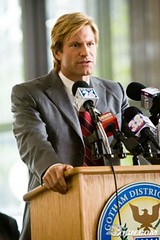 However, for a film wrestling with mankind’s lack of moral compass, the exhilarating anarchy of The Joker, and the heavy and seemingly unbearable weight of leadership, this movie – like it’s titular character – is exactly what it needs to be.
However, for a film wrestling with mankind’s lack of moral compass, the exhilarating anarchy of The Joker, and the heavy and seemingly unbearable weight of leadership, this movie – like it’s titular character – is exactly what it needs to be.
The story begins with a clown-masked bank robbery, unveiling the arch-nemesis Batman will be tangling with throughout the flick (played by the late Heath Ledger). However, The Dark Knight is not about the Joker, or Batman, but truly about Gotham City and its denizens. While the first movie dealt idealistically with whether or not Gotham should be saved, this installment is where the rubber Bat-Pod meets the road. Bruce Wayne’s lifelong friend and potential paramour Rachel Dawes (Maggie Gyllenhaal) is paired – in business and pleasure – with new District Attorney Harvey Dent (Aaron Eckhart). The photogenic yet genuine idealistic seeks to root out corruption inside the police department as well as removing the mob factions left in the city, who are beginning to band together. Even Bruce Wayne (Christian Bale) sees Harvey’s white knight crusade pointing to a possible end for his own dark nights, carrot-dangling the possibility for a normal life.
Dent conspires with Lieutenant Jim Gordon (Gary Oldman) and the Batman for an endgame run against the mob, but the Joker’s appearance on the city stage makes everything boil over. 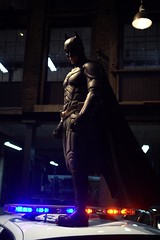 Suddenly, everyone – literally the entire city – is put in a place of moral quandary… leaving us pummeled by a film exploring ethics, civil law, justice and righteous action, and finally if “truth” is what mankind really needs. To the discerning viewer, it’s mentally and spiritually exhausting. Trusty Butler Alfred tells his master Bruce that he must “endure”. Director Christopher Nolan has given us a narrative that the viewer must endure, but the journey is ABSOLUTELY worth it.
Suddenly, everyone – literally the entire city – is put in a place of moral quandary… leaving us pummeled by a film exploring ethics, civil law, justice and righteous action, and finally if “truth” is what mankind really needs. To the discerning viewer, it’s mentally and spiritually exhausting. Trusty Butler Alfred tells his master Bruce that he must “endure”. Director Christopher Nolan has given us a narrative that the viewer must endure, but the journey is ABSOLUTELY worth it.
If anyone still thought you could still say “comic book movie” and that this phrase implied a certain sensibility, style, or genre, The Dark Knight has driven the final nail into that cliche-coffin. Even for director Nolan, the film departs from much of his familiar style seen in Memento to Batman Begins to The Prestige. By turning this film into an ensemble crime drama that lands stylistically between The Godfather 2 and Heat, he leaves familiar territory and seems to be experimenting. His cinematic chemistry set bears fruit with a great cast, tight editing, slight score, and reality-grounded camera-work set throughout Chicago streets. A lack of computer effects is notable, (yes, that truck flip was REAL) as Nolan relies largely on traditional stunts and physicality; many times you feel the film could have been made in the 70s.
It’s easy to heap praise on Heath Ledger for his performance of the Joker, 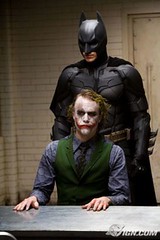 though some are giving undue accolades because of his passing and suggesting he “carries the film”. The film is truly carried corporately, born up like a testament to our war-weary, depraved world on the backs of the entire cast, a tired victor carried across the ball field in celebration by his teammates. Make no mistake Ledger IS superb, giving the world the wicked villain that comic fans always knew was possible from such seminal works as “The Killing Joke” and “Arkham Asylum“. Ledger did not reinvent the villain; he just finally gets him RIGHT. The interrogation room sequence, as he unsettles both Gordon and Batman, is truly Oscar worthy and the best drama we’re likely to see on camera this year. His mockery of our civilized veneer, and our hypocrisy, is a testament both to Ledger’s acting AND the insightful, articulate screenplay.
though some are giving undue accolades because of his passing and suggesting he “carries the film”. The film is truly carried corporately, born up like a testament to our war-weary, depraved world on the backs of the entire cast, a tired victor carried across the ball field in celebration by his teammates. Make no mistake Ledger IS superb, giving the world the wicked villain that comic fans always knew was possible from such seminal works as “The Killing Joke” and “Arkham Asylum“. Ledger did not reinvent the villain; he just finally gets him RIGHT. The interrogation room sequence, as he unsettles both Gordon and Batman, is truly Oscar worthy and the best drama we’re likely to see on camera this year. His mockery of our civilized veneer, and our hypocrisy, is a testament both to Ledger’s acting AND the insightful, articulate screenplay.
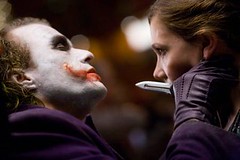 Maggie Gyllenhaal lends Rachel’s character a gravity Katie Holmes (in the first film) did not, and Christian Bale expands on the character of Wayne as we see him scarred physically and emotionally by the symbol he has created. Bruce is ready to give up, balanced by the elder wisdom of Alfred and Lucius Fox (Michael Caine and Morgan Freeman respectively, adding veteran weight to undergird the younger actors). Surprisingly understated, many will not recognize the excellent work by Gary Oldman, who as Jim Gordon is a powerful character with an unassuming posture. Both Oldman and Eckhart are ultimately given
Maggie Gyllenhaal lends Rachel’s character a gravity Katie Holmes (in the first film) did not, and Christian Bale expands on the character of Wayne as we see him scarred physically and emotionally by the symbol he has created. Bruce is ready to give up, balanced by the elder wisdom of Alfred and Lucius Fox (Michael Caine and Morgan Freeman respectively, adding veteran weight to undergird the younger actors). Surprisingly understated, many will not recognize the excellent work by Gary Oldman, who as Jim Gordon is a powerful character with an unassuming posture. Both Oldman and Eckhart are ultimately given 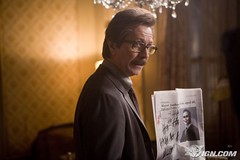 heavy lifting duty for the major emotional notes throughout the film, and they carry the weight.
heavy lifting duty for the major emotional notes throughout the film, and they carry the weight.
Without spoiling the film, the philosophical landing pad is far less hopeful than Batman Begins. In the first flick, Nolan gave us a Batman with a noble calling, removing the “revenge-driven” Wayne who puts on a suit every night to symbolically beat up the man who killed mommy and daddy. He focused the characters motivation toward loving a city that was not lovely, but needed love desperately, seeking restoration for a city most deemed “beyond saving” while balancing justice and mercy. This Batman was not about personal vengeance, but about redemption.
In The Dark Knight, Batman’s symbol has inspired mixed reviews from the people of Gotham, from harsh critics to obsessive fans. The city is still decaying, and we find that even people in needed roles of justice can still be compromised. It seems the “truth” is that we are still corruptible, wicked people, and that the only way 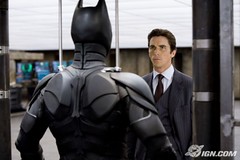 faith and hope can be maintained… is through deception. The film deals with the “necessity of lies”, as some characters find they are the only way they can help and inspire others. While their sympathy and intentions are understandable, one has to question the method… if this is truly paving the way toward any long-term redemption or just an extended descent into hell.
faith and hope can be maintained… is through deception. The film deals with the “necessity of lies”, as some characters find they are the only way they can help and inspire others. While their sympathy and intentions are understandable, one has to question the method… if this is truly paving the way toward any long-term redemption or just an extended descent into hell.
The biggest joke in this brilliant film is that the painted Ledger smirks and begs the question “why so serious?” in a film so sobering it makes you want to flee your own sense of sanity. Are we fooling ourselves as humans with our civilized masks and our higher purposes… making Ledger’s liberated Joker persona truly “ahead of the curve”? If the Joker is wrong – if there is something worth reaching for in this thing we call life – can the “city of man“ truly be held together by a “dark knight”, or is it important that we walk in the light, no matter the cost? Is faith nothing more than a willing blindness to the truth of our existence – something that helps us get through the day – or is there TRUTH that truly sets us free? After the shell-shock of this intense and truly phenomenal film fades, these are discussions worth having. If we don’t, you might picture the Joker smiling, watching us leave theaters like sheep, applauding us in our ignorance.
After all, it’s just entertainment… right? Why so serious?
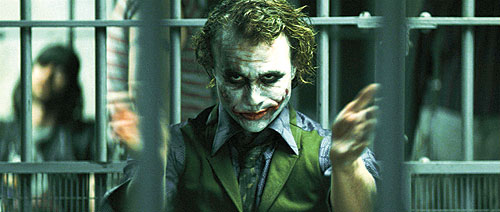
Go deeper with an audio examination of the film here.
*ALSO:
presented below, the 2006 Cinemagogue BATMAN review
(examining the character and focusing on Batman Begins)
 BATMAN – Detective Comics #27 hit the stands in In May, 1939. In it we saw the first appearance of Batman. The character and stories evolved and adapted in each decade. Torn from his parents as a boy by a thief’s twitchy trigger-finger, billionaire Bruce Wayne grew up obsessed with honing mind and body to perfection to combat such crime; he patrols Gotham City in the darkness as Batman, working outside the law to enact true justice and using terror to prey on the superstitious minds of his foes. As Bruce Wayne, he projects the image of a jet-setting playboy to cover his nocturnal activity. In this Cinemagogue presentation, we explore how this character has changed over a century and how director Christopher Nolan has translated this character into a truly redemptive narrative.
BATMAN – Detective Comics #27 hit the stands in In May, 1939. In it we saw the first appearance of Batman. The character and stories evolved and adapted in each decade. Torn from his parents as a boy by a thief’s twitchy trigger-finger, billionaire Bruce Wayne grew up obsessed with honing mind and body to perfection to combat such crime; he patrols Gotham City in the darkness as Batman, working outside the law to enact true justice and using terror to prey on the superstitious minds of his foes. As Bruce Wayne, he projects the image of a jet-setting playboy to cover his nocturnal activity. In this Cinemagogue presentation, we explore how this character has changed over a century and how director Christopher Nolan has translated this character into a truly redemptive narrative.
Podcast: Play in new window | Download
Subscribe: Apple Podcasts | RSS




I know that this is going to be unpopular, but I actually think that Heath Ledger played the Joker too hammy and over the top. The only thing keeping him from turning the role from terrifying menace into cartoony villain was the absence of him twirling a moustache. I’m not saying he ruined the role, but if he had pulled back 10-15% it would have added enough realism to make the Joker truly frightening.
On the other hand, I think that it was Aaron Eckhart who really stole the show here and is deserving of an Oscar nomination. He really showed a great range of emotion and in my opinion was the glue that held the story together.
Plans to tie this to your earlier discussion of Nolan’s exploration of self-deluding protagonists? 🙂
wow Jeremiah, did that comment ever turn out to be prescient – cue Inception…